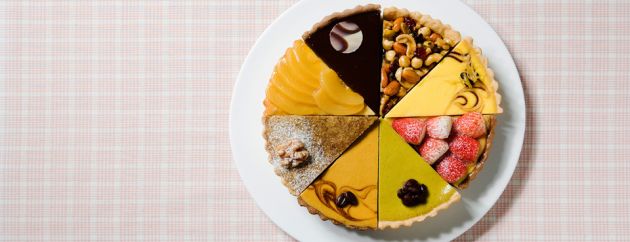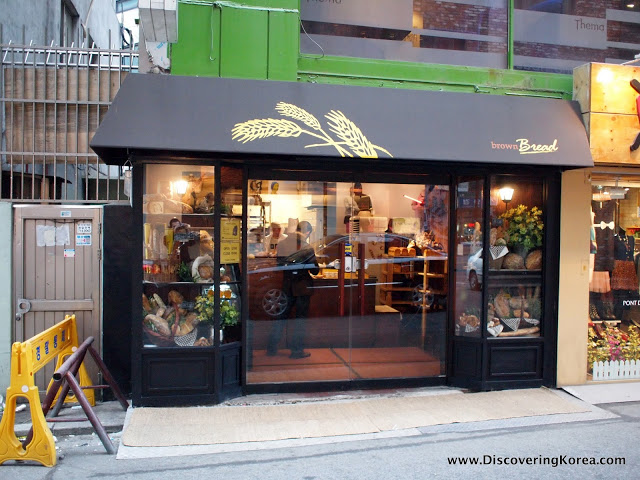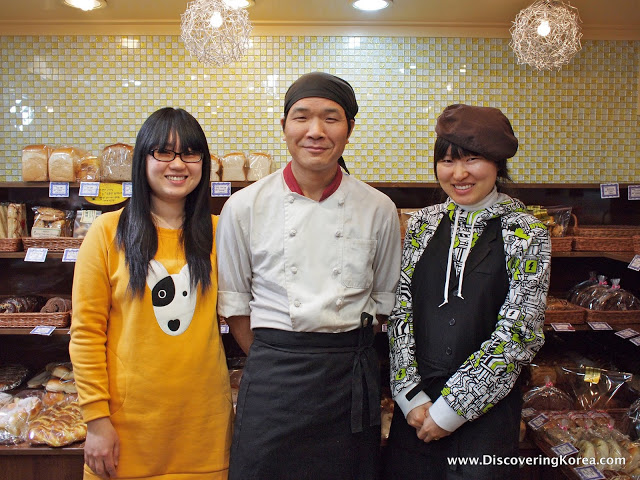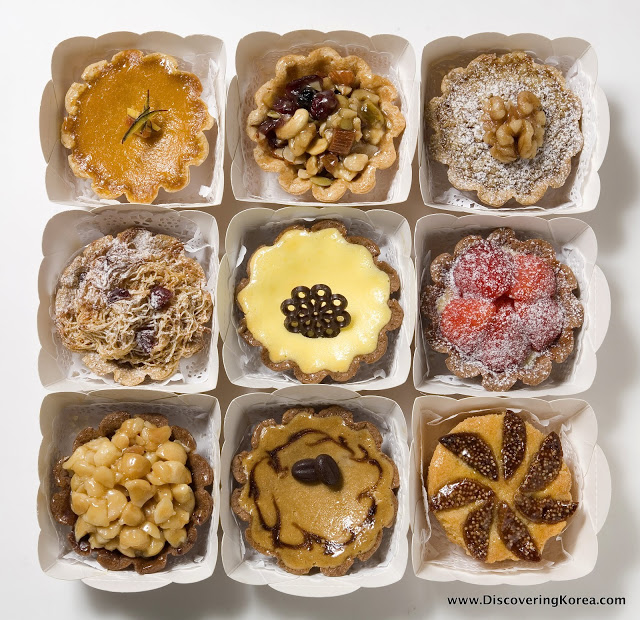Seoul’s best bakeries prove one of my many contentions, that Korea’s food culture eagerly samples what other traditions have to offer, adjusts it to fit the Korean palate, and then incorporates the foreign import.

When it comes to baked goods, historically, bread hasn’t figured prominently into the Korean diet, and most Korean homes still lack a conventional oven.
And yet, the neighborhood bakery has become as ubiquitous in Seoul as another import: the gourmet coffee chain. Of course, Seoul’s best bakeries have taken a Korean twist on Western baking traditions.
For example, red bean and sweet potato is more likely to fill your dough ball than a miscellaneous berry compote. Overall, I’d say that Korean pastries err on the side of subtle sweetness rather than fructose overload.
Many of Seoul’s best bakeries have French words in their name. But beyond the tall white baking hats and aprons, traditions like warm, fresh bread early in the morning haven’t arrived…
Brown Bread
Case in point is Brown Bread (브라운브레드), a tiny bakery in western Seoul’s Edae neighborhood.

If you’re hoping to sample one of their best-selling white baguettes, don’t plan on it for breakfast. The attractive storefront doesn’t open its doors until noon.
The charming, two-man operation started after they studied baking abroad. Today they specialize in loaves of white and rye baguettes, campagnes and ciabattas.
They also make “bretzels,” a crisp pretzel-baguette hybrid. No matter your choice, all go perfectly with a house-made honey-butter glaze.
| Open: | 12:00-19:00, Closed Sundays |
| Price: | Ciabatta: ₩2,500, Mini Pretzel: ₩1,000 |
| Address: | Seoul Seodaemun-gu Daehyeon-dong 27-46 |
| Directions: | Ewha Woman’s University (#241) on Line 2, Exit 1 |
| Phone: | 070-8658-1236 |
| Website: |
Abientot Bakery
Another favorite bakery is Abientot Bakery (아비앙또 베이커리), an unpretentious mainstay of the Daeheung-dong neighborhood for the past 30 years.

From the French term meaning, “see you soon”, the bakery opens at 6:00 am and stays open until midnight, and the smell of baking bread is how I found the small store over a year ago.
Inside the cheerful spot, an impressive selection of creative tartes, cookies, fritters, loaves of bread and even beautiful cakes and handmade jams are on offer.
Unlike the big franchise bakeries, Abientot can’t invest in expensive marketing efforts. Instead, they rely on “jeong”, a uniquely Korean word meaning deep affection.
Instead of discount cards, they thank customers by dropping generous extras into the bag. I’ve always found myself exiting with a smile, a hint as to why they keep flourishing even after a big chain bakery moved in next door. (UPDATE 1/13/2013: Abientot recently closed their Daeheung-dong location, but plans to re-open in the Hongdae area shortly. I’ll let you know when they let me know^^)
| Open: | TBD |
| Price: | Nut Pie Tartlet: ₩2,500, Bear Cookie: ₩1,300, Cakes: ₩15~20,000, Americano: ₩1,500 |
| Address: | Seoul Mapo-gu Daeheung-dong 265-1 |
| Directions: | Daeheung Station (#625) on Line 6, Exit 3 |
| Phone: | 02-713-6174 |
| Website: |
La Bonne Tarte
Our final stop is another spin on the French baking theme. As the name suggests, La Bonne Tarte (라본느타르트), an immaculate bakery and café located in the Daesin-dong neighborhood near Yonsei University’s east gate, specializes in tarts.

From macadamia nut and fig tartes to other seasonally-appropriate confections, it’s hard to decide what to order. But no matter your choice, the bakery uses only organic and trans-fats-free ingredients.
La Bonne Tarte also serves a wide variety of coffees and teas. Especially delicious is their ginger tea, complete with ample slices of raw ginger and sweetened with local honey.
Although it’s located in a new building, La Bonne Tarte’s classic furniture, brown tile and booth seating offer an old charm. For the perfect gift, choose their selection of tartes – packaged individually or as eight mixed slices in a striped box topped with a bow.
| Open: | 09:00-21:00 (Mon-Sat), 10:00-21:00 (Sun & Holidays) |
| Price: | Chocolate Chip Walnut Tarte: ₩3,500, Espresso Cheese Tarte: ₩4,500 |
| Address: | Seoul Seodaemun-gu Daesin-dong 90-1 (Gukje Building, 1F) |
| Directions: | Sinchon Station (#P314) on Gyeonghui Line, Exit 2 |
| Phone: | 02-393-1117 |
| Website: |
So there you go – three of Seoul’s best bakeries sure to impress even the most fickle connoisseur.
But what I’m wondering about is what Koreans think of the American chain Dunkin’ Donuts’ kimchi-flavored croquette that was introduced last year… I guess it’s a question for another post.
About Matt Kelley
Matt Kelly is native of the US Pacific Northwest and is half-Korean by ethnicity. He lived in Korea for five years and has written hundreds of travel guides for Wallpaper, TimeOut, the Boston Globe and Seoul Magazine and was a host for several different variety shows on Korean radio and television.
